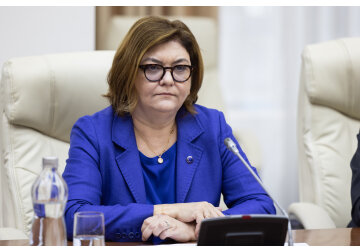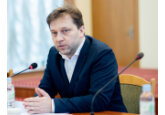
Moldova is the first non-EU country to sign the Agreement on Accession to Connecting Europe Facility and to have access to 26 billion euros of funding for infrastructure development.
The agreement was signed by Minister of Infrastructure and Regional Development Liliia Dabija and European Commissioner for Transport Adina Valean on May 9, in the presence of Prime Minister Dorin Recean. The Connecting Europe Facility, with a budget of 26 billion euros for 2021-2027, finances projects in the field of EU transport, energy and digital infrastructure. The signed agreement will allow project initiators from Moldova to apply for EU funding for projects of common interest in transport, energy and digital technologies, aimed at improving Moldova's connectivity with its EU neighbors. The agreement will support Moldova's integration into the EU single market, while contributing to economic growth, job creation and increased competitiveness. The signed agreement will contribute to attracting investments for the development of road and rail transport infrastructure, the implementation of energy efficiency and decarbonization projects in the economy, and will contribute to the digitalization of transport and energy systems. "I am pleased that the Agreement on Moldova's accession to Connecting Europe Facility has been signed, which will provide Moldova with better access to the funds necessary for the development of transport, energy and digital infrastructure within the country and for its interconnection with the EU through Romania. Moldovan citizens and businesses will have better infrastructure, which will facilitate trade and increase exports, which means more new jobs with good salaries, prosperity for the country," Prime Minister Dorin Recean said at a press conference. "The Connecting Europe Facility is the most important instrument for financing infrastructure projects. Moreover, this is an unprecedented moment, and Moldova can be proud of being the first country outside the EU to join this mechanism. Through it, Moldova will gain access to specific EU funding opportunities for transport, energy and digital infrastructure. Once the now-signed agreement is ratified, Moldova will be able to access funds for transport, energy and digital infrastructure along with EU member states. Railroads, bridges, links to Romania, energy networks - everything Moldova needs can be financed through this mechanism. Moldovan authorities and companies can participate in project competitions. The next call for projects, worth 2.5 billion euros, will be held in autumn and I hope that there will be projects from Moldova financed under this mechanism," Adina Valean, European Commissioner for Transport, said. The Agreement on Moldova's accession to the Connecting Europe Facility will be applied retroactively, starting from January 1, 2023, and will remain in force as long as this is necessary to complete all projects and activities financed under this Facility. According to the message of the European Commission, the signed agreement brings Moldova even closer to the EU through its inclusion in the interconnected Trans-European Networks. Moldova will have access to EU funding for transport, energy and digital services. With regard to transport, Moldovan authorities and companies will be able to apply for funding in the context of future calls for proposals for the Transport component of the Connecting Europe Facility from the current programming period (until 2027). The next call for proposals will be launched in September 2023. Priority is given to actions that strengthen the connection between the core network of Member States and the network in third countries. With regard to energy, the status of "Projects of Common Interest" can be requested for Moldovan energy infrastructure projects related to EU countries, based on the revised EU rules on energy infrastructure. "Projects of Common Interest" is a new concept introduced by the revised Trans-European Energy Networks (TEN-E) Regulation, allowing infrastructure projects connecting third countries with the EU to enjoy simplified authorization procedures and better access to financing. In November 2023, the European Commission will publish the next EU list of projects of common interest and, for the first time, projects of common interest with third countries. Another option available for Moldova to receive support under the Connecting Europe Facility is cross-border renewable energy projects. The digital component of the Connecting Europe Facility provides support for interconnection projects of common interest, in particular for backbone networks linking the EU to third countries, in line with the Global Gateway strategy, and for the development of secure infrastructure, secure and sustainable high performance, including gigabit and 5th generation (5G) mobile networks. As soon as the next calls for proposals under the Connecting Europe Facility - Digital are announced, project initiators from Moldova will be able to request co-financing for projects aimed at improving the capacity, security and sustainability of digital connectivity between Moldova and neighboring EU countries. // 10.05.2023 - InfoMarket.







